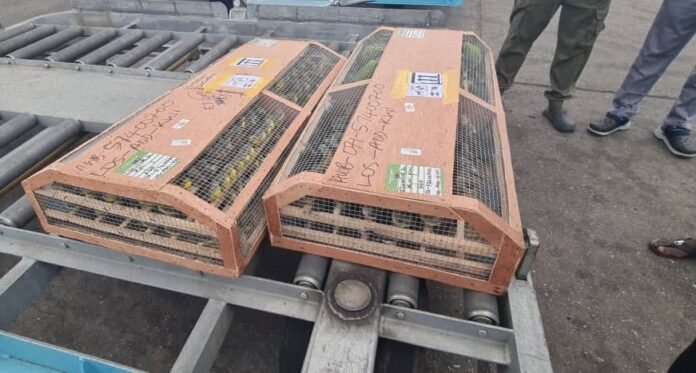In what has been described as Nigeria’s biggest seizure of wildlife by number, the Nigeria Customs Service (NCS) has intercepted 1,620 live birds at Murtala Muhammed International Airport, Lagos.
The exotic birds—ring-necked parrots, yellow-fronted canaries, and green-fronted canaries—were headed for Kuwait without the necessary permits or health documents.
“This is the largest single seizure in terms of quantity,” said NCS spokesperson Abdullahi Maiwada. He confirmed that the birds were confiscated during routine inspection on 31 July, but the agency kept the information under wraps until now to avoid “jeopardising ongoing investigations.”
The birds were found concealed in poorly ventilated cages, many appearing stressed and weak. The customs authorities believe the trafficking ring behind the export was operating a well-organised network.
Nigeria Still a Wildlife Smuggling Hotspot
Nigeria’s reputation as a hub for wildlife trafficking is well documented. According to customs, most animals smuggled out of Nigeria are destined for Asian countries.
The country’s porous borders, weak enforcement, and corruption have made it a go-to route for illicit exports of ivory, pangolin scales, and exotic birds.
Despite being a signatory to CITES—a global agreement that regulates trade in endangered wildlife—enforcement remains a major challenge.
“The birds will be handed over to the National Park Service for rehabilitation and eventual release into the wild,” Mr Maiwada added.
Songbirds like canaries are especially prized in the illegal market, often sold for singing competitions. Some wild parrots can fetch more than $1,000 each, according to BirdLife International.
Who’s Behind the Birds?
The customs authority is now investigating the owners of the seized shipment. Officials say prosecution will follow once the culprits are identified.
“We want to make a strong statement to wildlife traffickers that Nigeria is not a safe route anymore,” Mr Maiwada insisted.
With global illegal wildlife trade valued between $7 billion and $23 billion annually, experts say more must be done to protect species and disrupt syndicates.
How should Nigeria better protect its biodiversity? And how do we sensitise the citizens on the value of maintaining our wildlife? Share your views here→Rate, Like 👍, Comment💬, share this article, Follow us on our social media handles, and Submit your own story to get featured and earn rewards!







